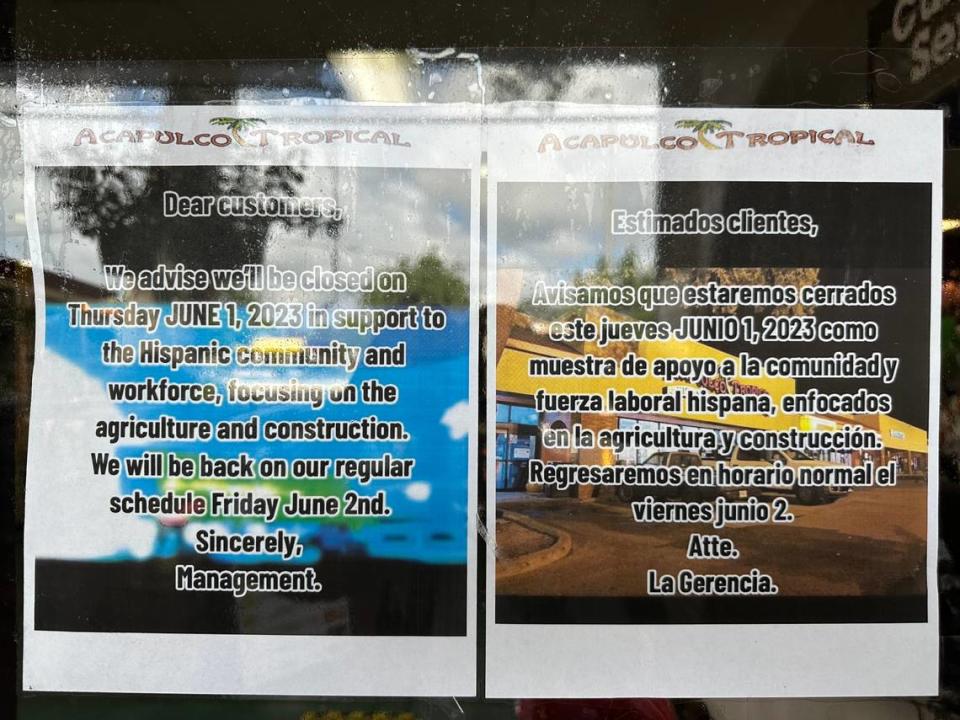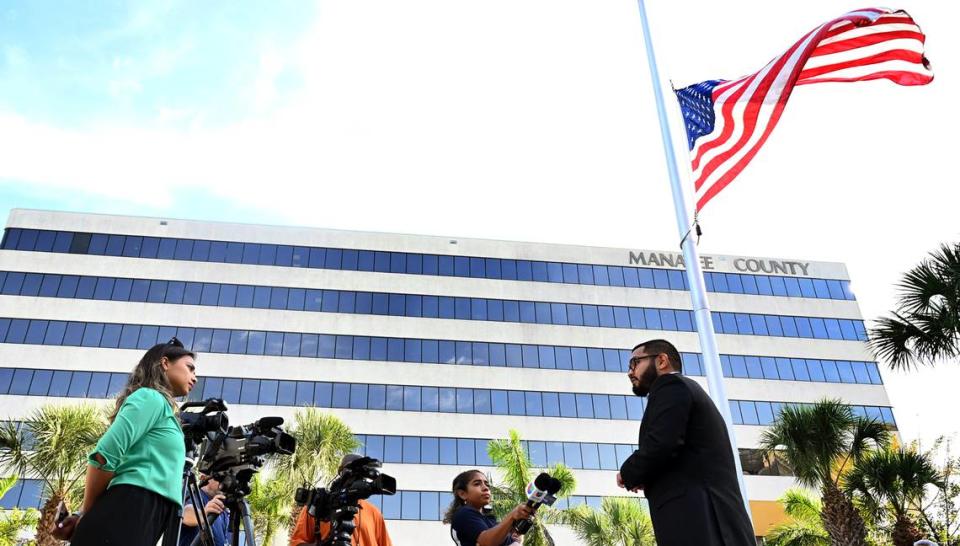‘Absolutely panicking.’ New Florida law has Bradenton immigrants leaving, employers worried
The never-ending, decades-long debate over immigration reform periodically throws a real scare into the voiceless community that supplies the labor for some of America’s most back-breaking work.
It’s no secret that many roofers, asphalt spreaders, tomato pickers, dish washers and the crews that mow neighborhood lawns are immigrants. Not all of them have the proper documents to work in the United States, yet native-born Americans are not exactly clamoring for those jobs.
Gov. Ron DeSantis’ recently signed Senate Bill 1718, making E-Verify mandatory for employers with 25 or more employees, starting July 1. It is a federal online database that instantly confirms a person’s eligibility to work in the U.S., including whether they are a citizen or have a Social Security number.
The purpose?
“To combat the dangerous effects of illegal immigration caused by the federal government’s reckless border policies,” according to a news release from the governor’s office.
The bill has created fear and panic among immigrants, and raised concerns in the wider Latino community, especially agricultural areas like Manatee and DeSoto counties.
Some have already left the state, and employers are worried.
Protesters gathered in downtown Bradenton on May 12, the day after DeSantis signed the bill, to speak out against the new immigration law.
More recently, there have been reports of workers leaving Florida because of concerns about the law.
Last week, several protests for “A Day Without Immigrants” were held across Florida and the country. At least 30 Hispanic businesses in Southwest Florida, including several in Bradenton, closed their doors for the day to make a statement about the importance of immigrant labor.
A sign on the front door of the Acapulco grocery at 3525 First St. E., Bradenton, on Thursday said the store was closed for the day in support of the Hispanic community and workers in construction and agriculture. The sign said the store would return to regular hours on Friday.

Workers ‘considering leaving’
“We have had a number of employers say they have had some people leave or are considering leaving,” said Kelly Kirschner, chair of Unidos Now and a former mayor of Sarasota, of the direct effect of SB 1718.
“Go to downtown Bradenton or Lakewood Ranch and walk around the job sites and see who the workers are. We have functional zero unemployment in Florida,” Kirschner said, adding that the construction, agriculture and hospitality sectors will all feel the effects of SB 1718.
Jon Mast, CEO and lobbyist of the Manatee-Sarasota Building Industry Association, says the construction industry will be affected by SB 1718.
But some of the concerns are overblown, he said.
“I think it’s fear of the unknown. If you already have less than 25 employees, you don’t have to do the E-Verify,” Mast said.
It’s only the companies with more than 25 employees who have new hires after July 1 that will have to use the system, he said.
“I don’t think it is an insurmountable problem, but labor continues to be a problem. We don’t want to lose workers to neighboring states. Let’s take a deep breath and look at the bill,” Mast said.
“I have heard of workers leaving the state, it’s not a joke. But most of them left because they didn’t understand what the bill says,” he said.
‘They are panicking’
C. J. Czaia, a Bradenton personal injury attorney and long-time advocate for immigration reform, said that a local construction company recently invited him to talk to its workers to allay concern about SB 1718.
“They are panicking. People aren’t going to the hospital for fear of being turned over to immigration officials. They are absolutely panicking,” he said.
While hospitals ask patients to complete a questionnaire, including their immigration status, they don’t send that information to the Department of Homeland Security. Patients can also decline to answer questions about their immigration status.

Kathleen Cramer, executive director of Turning Points in Bradenton, said some of those who have dental or medical appointments there are similarly not keeping their appointments for fear of being rounded up by immigration officers.
Services at Turning Points are not dependent on immigration status, and the nonprofit doesn’t ask, she said.
Czaia’s voice has been quiet in recent years, but the new E-Verify bill is waking him up, he said.
“Immigration is a federal issue. This is an overreach. It’s unconstitutional,” Czaia said. “It’s immoral. It’s horrible.”
The law’s language
Diana Gonzalez has a daily program on three of Solmart Media’s Spanish radio stations, where her audience is the growing Hispanic community in Southwest Florida.
One of her goals is to calm her audience and assure them that not much has changed since DeSantis signed SB 1718.
“E-Verify has existed since President George W. Bush,” Gonzalez said.
Even so, the new law could mean fines of $1,000 a day and suspended licenses for employers who don’t use E-Verify three or more times over two years.
DeSantis has called the law the “strongest anti-immigration legislation in the country,” though parts of it are likely to be challenged in court.
It invalidates driver’s licenses from other states issued to undocumented people, and requires hospitals that get Medicaid funding to ask for immigration status.
It also allows law enforcement officers to act as immigration police, critics say.
The new law makes it a third-degree felony to use fake documentation and to transport an undocumented person into the state, punishable of up to 5 years in prison or a $5,000 fine — per person. Penalties are higher for transporting children or five or more people.
An earlier version of the bill included transportation “into and within” the state, but the final version only says “into the state.” Still, the fear of being stopped by police has spread, especially for those families where some are documented and some aren’t.
At a recent League of United Latin American Citizens (LULAC), a mother said that when she tells her children goodbye in the morning, she doesn’t know if she will be coming home, Gonzalez said.
The mother makes sure she and her husband take different routes to work, in case one of them is stopped.
“When someone leaves (the state), they take their entire family,” Gonzalez says of the fear that has gripped many in her audience.
Restaurant workers
The Florida Restaurant and Lodging Association is also taking stock of what SB 1718 means.
“Overall right now, FRLA is working to inform our members and get their feedback, connect with industry advisors, and assess the impacts of the new law; it’s too soon to gauge full impact and therefore it would be premature to speculate until we know more,” Ashley Chambers, communications director for the association, said in an email.
John Horne, chief executive of Oysters Rock Hospitality, who owns and operates Anna Maria Oyster Bar restaurants and Café L’Europe, said the new E-Verify bill will affect the entire state.
“I have heard of people leaving our area and there will be more. Immigration is a problem, but this is drastic,” Horne said.
“I think the repercussions will be incredibly tough,” he said.
There may be as many as 800,000 undocumented immigrants ages 18-55 in Florida, Kelly Kirschner said.
Horne and others would look to see a pathway forward for those workers to allow them to work without fear.
A pathway forward
A pathway forward for those in the United States to work, earn money, and often to return to their home country has been discussed for decades by political leaders with little to nothing to show for all the talk.
In 2001, just months before the terrorist attacks of 9/11, there seemed to be movement toward an overhaul of the U.S. immigration system, in recognition of the many thousands of undocumented workers in the United States from Latin America.
Several local growers spoke out at the time in favor of a system allowing easy work permitting to allow easy flow back and forth across the U.S. border.
“We are totally dependent on the Hispanic workers. The whole United States is dependent on Mexican labor for minimum-wage jobs. It gives us the labor we need and it gives them the economy they need. Trying to stop them at the border is not the answer,” one said.
Fast-forward to 2023, and any kind of political compromise on the immigration issue seems unlikely, Czaia said.
“Both sides have gotten into ownership of the government. We’re so gerrymandered,” he said.
The last meaningful immigration reform was in 1986 when Ronald Reagan was president, Czaia said.
A step forward would be to increase funding for the immigration system so that they are enough judges and immigration workers to expedite cases, Czaia said, adding that he knows of one political asylum case in Miami that has been awaiting a hearing for seven years.
Harvesting the crops
Manatee County tomato growers are leery about going on the record about SB 1718, but Michael Schadler, executive vice president of the Florida Tomato Exchange offered some comments.
“The Florida tomato season is just finishing up this week as the harvest starts moving north, so we’ll be in our offseason when this law goes into effect,” he said.
“The tomato industry in Florida may be less impacted than some industries in the state because so many of our growers have already moved to the H-2A guest worker program. The labor pool in Florida is already so tight that our growers have to use the H-2A program to guarantee that we’ll have workers to harvest our crop. But the new law will be a challenge for Florida agriculture as a whole because it will further tighten the availability of workers in the state,” Schadler said.
“Harvesting fruits and vegetables is hard work. In this tight labor market, wages can be well above minimum wage, but we still have trouble finding sufficient workers, which is why so many growers have begun using the H-2A program, even though it is very cumbersome and expensive to use,” he said. “And there’s a cap to how much we can pay for workers because tomato growers are primarily competing with imported tomatoes from Mexico, which pay their workers for one day what we pay per hour.”


 Yahoo Sports
Yahoo Sports 